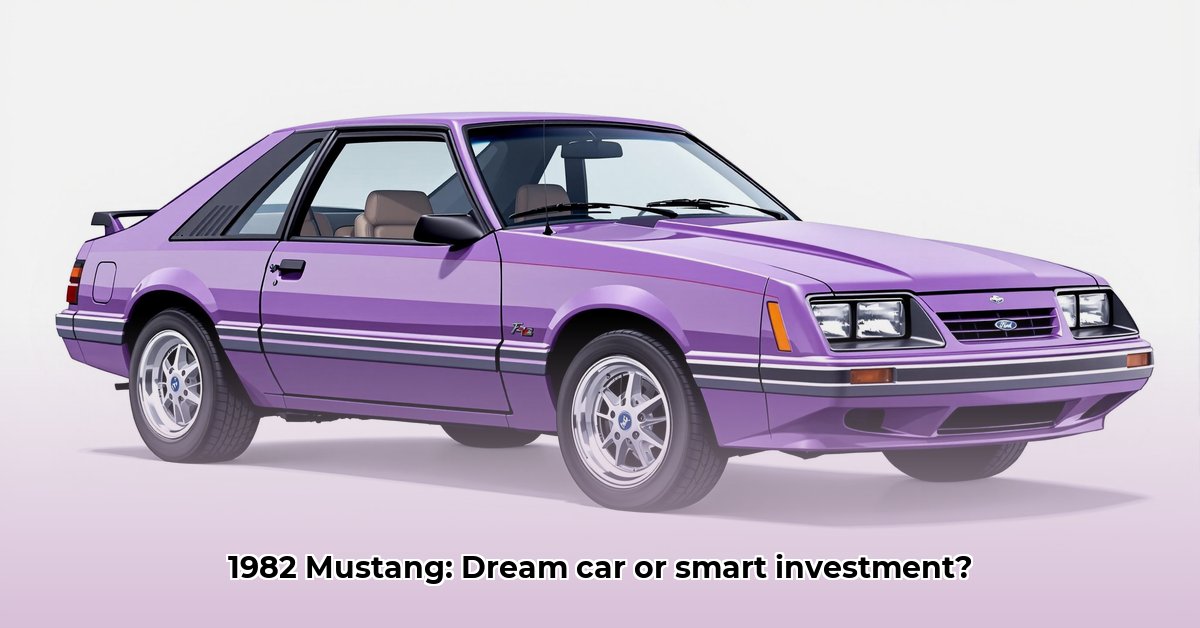
Understanding the 1982-1984 Mustang Market: A Hidden Gem
The 1982-1984 Ford Mustang market presents a unique opportunity for discerning classic car enthusiasts. These vehicles, while not as instantly recognizable as their '60s counterparts, represent a compelling blend of affordability and potential for appreciation. Their relative obscurity translates to a smaller, more specialized market, making it a smart move for those willing to invest the time in finding the right car. But this niche nature also presents challenges: limited supply means finding a well-maintained example requires diligent searching and a keen eye for detail. It's a seller's market, so buyer preparedness is crucial. Why is this specific era of Mustang increasingly sought after? The return of the potent 5.0L V8 engine played a significant role in bolstering its desirability amongst collectors.
Finding Your Perfect 1982-1984 Mustang: The Search Begins
Your quest starts online. Websites specializing in classic car sales, such as eBay Motors and Hemmings, are excellent starting points. However, captivating photos shouldn't be your sole focus. Thoroughly examine the descriptions. Detailed condition reports are non-negotiable. A comprehensive account of the car's mechanical and cosmetic condition is critical. Don't be afraid to ask probing questions to the seller. Remember, a stunning photo can cleverly mask significant hidden issues. A pre-purchase inspection by a trusted mechanic familiar with classic Mustangs is highly recommended, helping you to avoid costly surprises down the line.
Your Mustang Checklist:
- Bodywork: Inspect meticulously for rust (a common problem in older vehicles), dents, and mismatched paint. Minor imperfections are acceptable, yet significant body damage could render the vehicle a costly project.
- Engine Bay: Check for leaks (oil stains or other fluids), listen attentively for unusual noises (knocking, ticking, squealing), and look for signs of neglected maintenance—signs of neglect can severely impact the car's overall reliability.
- Mechanicals: A compression test is essential; it provides insight into the health of the engine's cylinders. This is a crucial step that no potential buyer should ever overlook.
- Interior: Examine the upholstery, carpets, and dashboard carefully for wear and tear. Tears, stains, and fading are common but can significantly affect the vehicle’s value.
- Documentation: Service records and any paperwork that documents the car's history are invaluable. This documentation provides evidence of past repairs and maintenance, demonstrating a history of responsible care and positively impacting the car's desirability, and ultimately its value.
Assessing a Mustang's Value: More Than Just a Number
Pricing a classic car is an art, not a science. While online listings offer a starting point, they aren't definitive. Condition, mileage, and optional equipment all heavily impact value. A pristine, low-mileage Mustang in excellent condition will command a premium price compared to a project car requiring substantial restoration.
To determine a fair price consult these resources:
- Online Resources: Utilize specialized classic car valuation websites (like Hagerty) and auction results for comparable Mustangs.
- Expert Appraisal: An expert appraisal from a classic car specialist or a knowledgeable mechanic provides an objective assessment. This is a particularly wise investment for rare or high-value vehicles.
- Comparable Sales: Review recent sales data of similar Mustangs to establish a realistic price range.
Remember, a thorough assessment considers the overall condition, any necessary repairs, and the rarity of specific options or trim levels.
Negotiating a Purchase or Sale: The Art of the Deal
Negotiation is key in this seller's market. Buyers need to be prepared to act decisively and confidently present a fair offer supported by your research. Sellers should justify their asking price with evidence of the vehicle’s condition, rarity, and any unique features. Remember, respectful communication and a well-informed approach can lead to mutually beneficial outcomes.
Post-Purchase/Post-Sale Considerations
For Buyers:
- Insurance: Obtain comprehensive classic car insurance; standard policies may not adequately cover collector vehicles.
- Maintenance: Budget for regular servicing and potential repairs. Sourcing parts for older vehicles can sometimes be challenging, so factor this into your long-term ownership costs.
- Community: Join a Mustang club or online forum for expertise and camaraderie.
For Sellers:
- Documentation: Accurate and thorough documentation of the sale is essential for legal compliance and protecting your interests.
- Legal Compliance: Ensure you follow all relevant legal requirements for selling a used vehicle.
The 1982-84 Ford Mustang represents more than just a car; it's a piece of automotive history. With careful research, thoughtful negotiation, and ongoing care, owning one can be a rewarding experience.